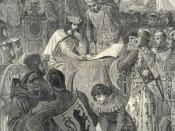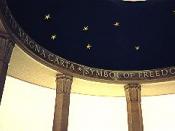After the French Indian War, Britain's debt rose to approximately 143,000,000 pounds. Britain also gained from the French; Canada, the Ohio Valley and some Caribbean islands. The new territory the British gained came at far too high a price, for the cost of governing the colonists who inhabited the lands jumped from 7,000 to 35,000 pounds per year. In the past, the British had not been overly aggressive in enforcing laws within the colonies, allowing the colonists' to govern their own trade and life as long as Britain profited from it. This was known as Salutary Neglect. Now, in order to recover from their deficit and deal with their new expenses, the British changed their policies. They enacted laws that definitively set up a Mercantilistic system. Raw materials were shipped from the colonies to Britain where the materials were turned into manufactured goods and sold at high profits. The British also made new tax policies.
The colonists were taxed on everything from tea to paper. The colonists had previously been taxed indirectly, but the sudden addition of direct taxes angered the colonists. These incidents enraged the colonists to such a degree, that at least a third of the colonists, known as Patriots, wanted to rebel from British rule. Others, known as Loyalists, believed that the colonists should remain loyal to the king. The colonists should become Patriots due to Parliament's unfair and arbitrary tax and trade policies as well as Parliament's violation of basic human rights.
Parliament denied the colonists the basic freedoms they deserved. For example, in the Massachusetts Government Act, the colonists of Massachusetts had their right to
Self-government repealed until the British were compensated for tea that was destroyed by a rebellious Boston mob. Another basic right that was violated was one of privacy. The British Writs...


